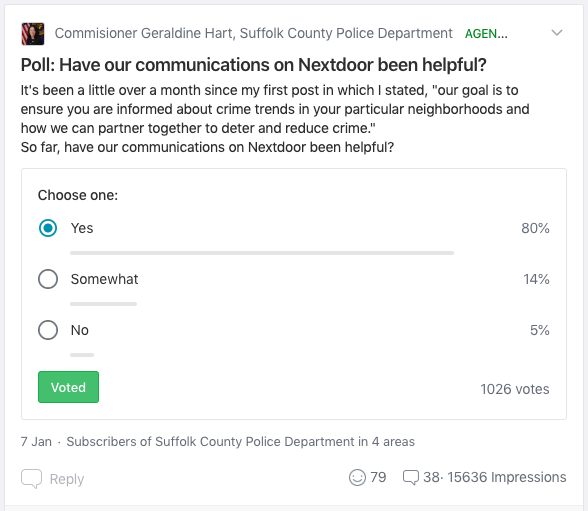You’ve likely heard about Nextdoor, and you’re probably reading this to learn more about how you and law enforcement officers around the county can use Nextdoor for Public Agencies, our free government interface, to help your reduce crime and the fear of crime while increasing transparency and trust.
The purpose of this engagement plan is to provide you with everything you need to know about how to get the most of our Nextdoor for Public Agencies so you can hit the ground running confidently. If we’ve left something out, leave a comment to let us know!
In this post, you will learn about how neighbors use Nextdoor in their neighborhoods; how law enforcement officers are using Nextdoor for Public Agencies; what, where, how often to post message on Nextdoor and which staff to give access; key ingredients to delight residents, best practices to drive engagement, frequently asked questions, and helpful resources and how to get technical support; and finally, impactful messages to share with your residents on Nextdoor.
What is Nextdoor?
Nextdoor is the world’s largest social network for the neighborhood. Nextdoor enables truly local conversations that empower neighbors to build stronger and safer communities.
Building connections in the real world is a universal human need. That truth, and the reality that neighborhoods are one of the most important and useful communities in our lives, have been a guiding principle for Nextdoor since it was founded in 2011. Neighbors in the United States, United Kingdom, France, Germany, the Netherlands, Italy, Spain, Australia, Denmark, and Sweden are using Nextdoor.
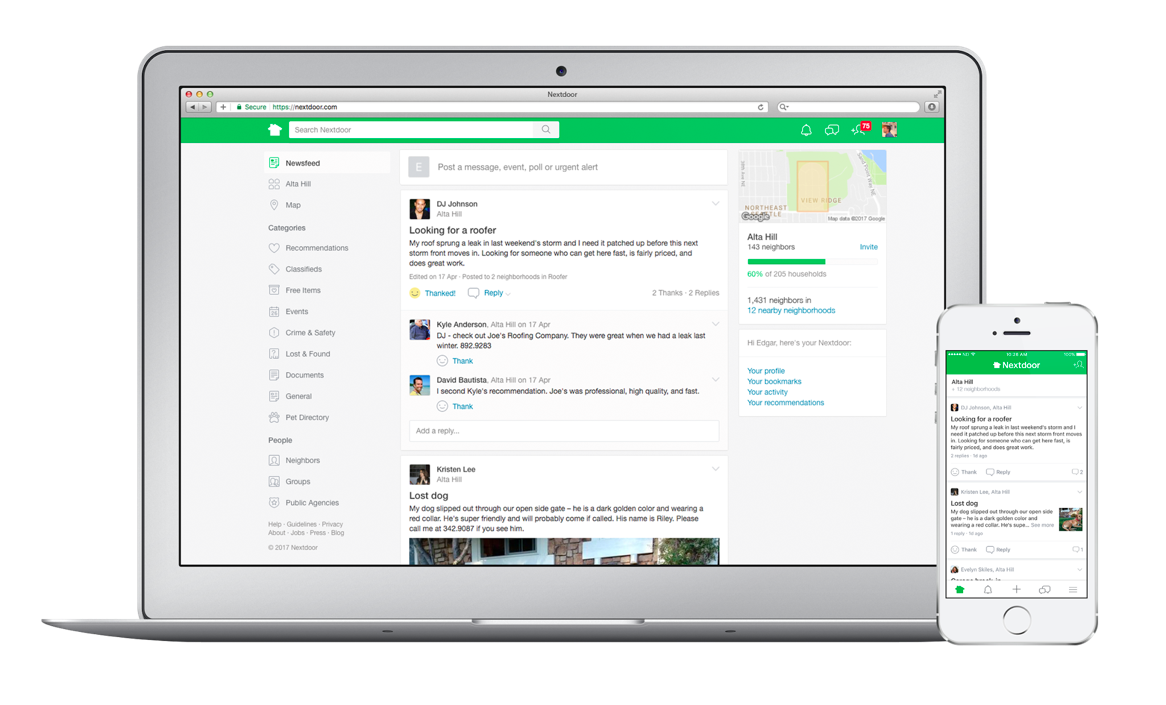
Neighbors rely on Nextdoor to connect with their local communities and have conversations about everything from finding a local service provider to learning about a rash of break-ins. Unlike other social media platforms, Nextdoor was built from the ground up with the neighborhood in mind.
What makes Nextdoor different from other social platforms?
Nextdoor is Hyperlocal. Neighborhoods are founded by neighbors, with mapped boundaries.
Nextdoor is Private.Only members with a verified address may access their community’s Nextdoor neighborhood. Members are also required to use their real names
Nextdoor Useful.Recommendations, classifieds, events, crime & safety, and more!

What is Nextdoor for Public Agencies?
Nextdoor for Public Agencies, our free government interface, enables law enforcement to build strong ties and trust with the neighborhoods they serve to improve the effectiveness of relational, community, and problem solving policing efforts.
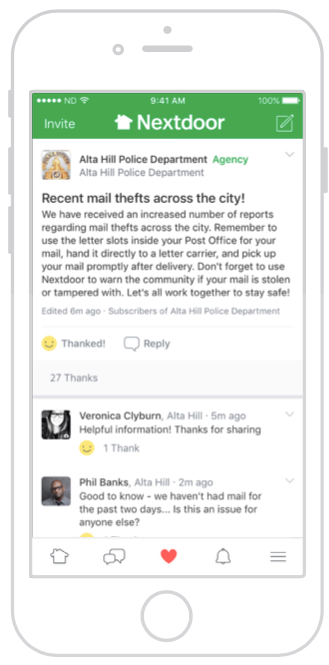
With access to Nextdoor for Public Agencies, officers and staff can geo-target messages to specific neighborhoods or services areas, or their entire municipality improving the reach and efficiency of their outreach. Nextdoor members who are verified residents automatically receive communications.
Unique capabilities and differentiators:
Reach residents in the right places.Share information with whom it matters most by sending messages to targeted service areas and neighborhoods.
Engage in constructive conversations.Mitigate online “trolling” by ensuring residents are who they say they are — Nextdoor users must verify their address, use their real name, and adhere to community guidelines.
Drive positive outcomes offline.Solicit feedback, educate the community with interactive polls, and improve attendance at local events and training sessions.
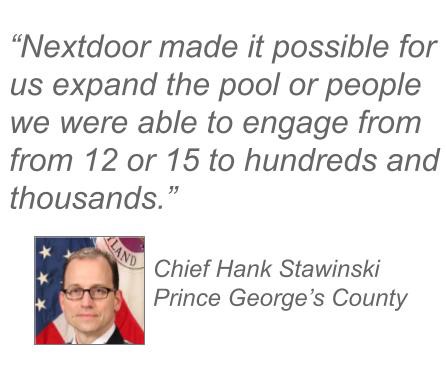
Not using Nextdoor for Public Agencies yet, get started by applying for access at Nextdoor.com/agency
What to post
We think about posts in two categories, Inform & Educate and Activate, and we’ve broken out examples accordingly below.
Inform & Educate
As needed — post discussions about:
- Property crime trends
- Incident-specific information
- Emergency notifications
- Crime prevention tips
Educate via Polls: See polls webinar recording
- Which option best describes the last time you called 911 to report suspicious activity?
- Do you use window stops?
- Which option best describes what you do with your valuables when you park your car?
- Did you know we do free home safety inspections?
Activate
As needed — post discussions to get neighbors to:
- Attend a local meeting, workshop or training
- Identify and report suspicious behavior and crime
- Become a member of a neighborhood watch
- Register for the Citizens Academy
As needed: Post urgent alerts to:
- Shelter in place.
- Be on the lookout
As needed: Post discussion and polls to gather intelligence:
- Did you observe someone walking down the street looking into vehicle windows and wiggling door handles?
- Submit video footage between certain times to…
How often to post and where
Neighborhood —As often as you like/need to
Citywide/Countywide —Weekly
Statewide —Monthly (Please close discussions)
If there is a major announcement or incident, post as needed where needed
Which staff to give access
PIOs + DC of Patrol Chief/Commissioner, district command staff, as well as community policing, crime prevention, community liaison, and school resource officers.
How to delight your residents with communication on Nextdoor
- Communicate with the aim to increase resilience and trust
- Think and communicate like a community organizer — Tell people what is happening, what you are doing about it, and tell them what they can and should be doing
- Communicate regularly and allow discussion. Do not close discussions by default.
- Geo-target communications so they are locally relevant
- Respond to questions as time allows and acknowledge breakdowns and appreciations
- Seek input, educate, and gather situational awareness with Nextdoor Polls for Public Agencies
Best practices to drive engagement
- Subject Line — Keep them short and sweet — Tell residents what is happening and where
- Tone — Write in a neighborly tone as if you were speaking to your neighbor
- Answer questions — Nextdoor members want to have a conversation with you, they don’t want you to push content at them and not allow them to respond or ask questions.
- Photos — Every post including polls should have a photo — wider photo’s look better than taller ones
- Videos — Add videos by including URL links to Vimeo, Youtube, and Facebook videos
- Attachments — Do not attach word documents. Save PDF’s as PNG’s to get more eyes on your content. Always include the who, what, where, when, and why in the message.
- Measure impact with the Content & Engagement report and by downloading polls results
Frequently asked questions about Nextdoor for Public Agencies
- Do people need to like/fan/subscribe to receive our posts? No, Nextdoor for Public Agencies is an opt-out platform, all members automatically receive your messages. Should they wish, they can unsubscribe from the agency or mute individual users.
- Can members start a conversation with us? No, communications are initiated by agency user.
- How can do residents interact with agency users? Residents see agency posts on their Nextdoor website or mobile app, as well as through email. Residents can thank and reply to agency posts, or send agency users private messages. If needed in profile settings, you can disable private messages.
- Do we have to monitor or moderate resident-to-resident conversations on Nextdoor? No, agency users cannot see information about residents or what they are discussing in their neighborhoods.
- Can we push a message out and not allow engagement? Yes, where applicable, you can close a discussion. In most cases, we do not recommend, closing discussions.
- Can we access Nextdoor for Public Agencies on our Mobile Device? Yes, you can log in from your mobile phone at nextdoor.com/login. The app is only available to residents.
- How is archiving handled? Our system archives all your posts for you, nothing is deleted. If you need it, we have a retrieval tool. In the future, we plan to offer an API for archiving vendors to use.
Resources and how to get support
- Agency resource center — https://nextdoor.com/agencyresources
- Technical help center — https://nextdoorhelpcenter.force.com/s/
- Agency user community http://agencyforum.nextdoor.com
- Weekly training webinars — bit.ly/NextdoorGovWebinar
- End-user training manual — http://bit.ly/NDPAEnduser
- Administrator training manual — http://bit.ly/NDPAAdministrator
- Email support — agencysupport@nextdoor.com
- How to submit shapefiles — https://help.nextdoor.com/s/article/How-to-add-service-areas
Impactful messages to share on Nextdoor
Table of content:
Your first post on Nextdoor
- Introductory message
Powerful crime prevention messages
- Poll: What type of information would you find most helpful on Nextdoor
- Discussion post: Subject: Top 10 home burglary prevention tips
- Discussion post: Garage door safety tips
- Discussion post: Summer vacation crime prevention tips
- Discussion post: Remove it, lock it, or lose it
- Discussion post: Lawn equipment theft prevention tips
- Discussion post: Utility trailer theft prevention tips
- Poll: If you own a gun, is it stored safely?
- Discussion post: What is suspicious activity?
- Discussion post: Top 10 tips to keep you safe while walking
- Discussion post: Top 10 ATM Safety Tips
General public safety posts:
- Poll: Can YOU SEE your house numbers/address on your mailbox/house?
- Poll: Did you know you can sign up to receive urgent alerts from Nextdoor via text?
- Did you know Nextdoor will pay for and mail postcards for you to invite your neighbors whom you do not yet know?
Assessing the value of communications on Nextdoor
- Poll: Have our communications on Nextdoor been helpful?
Introductory message
Subject: Hello from the [Agency Name] Police Department
Hello, neighbors!
My name is [Your Name] and I am the [Your Title] at [Agency Name] Police Department. I am pleased to let you know that starting today; we’ll start using Nextdoor’s free government interface to partner with you and your neighbors to build community, improve quality of life, and work together to make your neighborhood safer and stronger.
As a member of Nextdoor that lives in [City/County], you’ll automatically get our messages. If you no longer wish to receive our updates, you can manage your preferences here — http://bit.ly/NextdoorGovManage
Please keep in mind that your Nextdoor neighborhood network remains private to only those of you who are verified residents of your Nextdoor neighborhood network. I am NOT able to see what you and your neighbors are discussing, I will see your thanks and replies to our posts.
We will not be monitoring Nextdoor 24/7 and will respond to replies only as capacity allows. You must NOT use Nextdoor to request emergency services. If you need police services, please call 911.
I look forward to interacting with you here on Nextdoor and learning from the experience!
With gratitude,
[Your Name]
[Your Title]
[Agency Name]
Powerful crime prevention messages
Poll: What type of information would you find most helpful on Nextdoor
For “Ask a question”: What type of information would you find most helpful on Nextdoor?
For “Add a poll description”: Dear neighbors, I would appreciate you taking a moment to tell me which ONE option below best reflects the type of information would find most helpful on Nextdoor. Only choosing one option will rank rate what everyone finds most helpful and will direct where we focus our efforts on this platform.
For “Add a choice” fields:
- Crime prevention tips
- Property crime trends
- Neighborhood crime reports
- Incident-specific information
- Upcoming meetings and classes
- Emergency notifications
- Stories about the department engaging the community
- Other (add comments in the ‘reply’ section below)
Discussion Post: Top 10 home burglary prevention tips
Subject: Subject: Top 10 home burglary prevention tips

Neighbors,
Did you know that a home burglary occurs approximately every 15 seconds in the United States? Nearly 66% of all burglaries are residential, and of those, 62% occur during the daytime, between 9 a.m. and 3 p.m., when no one is likely to be at home. It’s also important to know that 30% of all burglaries are classified as “unlawful entry,” meaning the burglar was able to gain entry without using force — often through an unlocked door or window.
Here are the top 10 things you can do to help prevent your home from being broken into:
1) Lock your doors and windows
2) If you open your window, use window stops
3) Make sure valuables are not visible from windows (use curtains)
4) Store ladders and any objects that can be used to assist in home entry in a locked shed or garage.
5) Keep garage doors closed and locked. If the garage doors have windows, put the garage door release cord away from those windows.
6) Use a home security system and a doorbell camera to deter thieves.
7) At night, turn your lights on and leave them on (light is a great deterrent).
8) Use solid wood or metal doors.
9) Lock your pet door so it cannot be used as a point of entry.
10) Do not open the door for or allow solicitors entry to your home.
If someone is trying to gain access to your home or a neighbors home or exhibiting suspicious behavior, or you are not sure, please call 911 first.
When you call 911, state your location, the address where you are, the closest intersection, and the city/town you are in followed by the reason for calling and give a description of the behavior you are witnessing and of persons.
Finally, remember that a person’s behavior is what makes them suspicious, not what they look like. Check out Nextdoor guideline for identifying and communicating about suspicious behavior — -> https://help.nextdoor.com/s/article/How-to-communicate-a-crime?language=en_US
If you have any tips to share, please leave them below.
Discussion Post: Garage Door Safety Tips
Subject: Garage Door Safety Tips
Neighbors, did you know a zip tie can prevent someone from using a wire hanger from pulling the release handle or cord or release handle directly to open your garage door?
Watch this short video to learn how easy it is for someone with a wire hanger to break into your garage and to learn how you can secure your garage release handle with a zip tie.
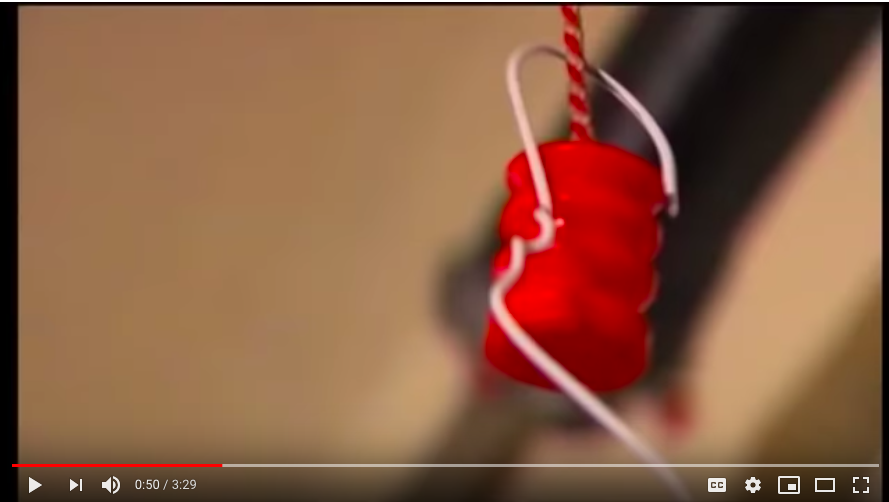
Also, be sure to:
- Always keep your garage door shut, even when you are home, and
- Block or frost the windows so others can’t see in
Got other tips to share? Let us know in the comments.
Discussion Post: Lawn Equipment Theft Prevention Tips
(Courtesy of Sgt. David Hicks from Montgomery Police Department)
Subject: Lawn Equipment Theft Prevention Tips
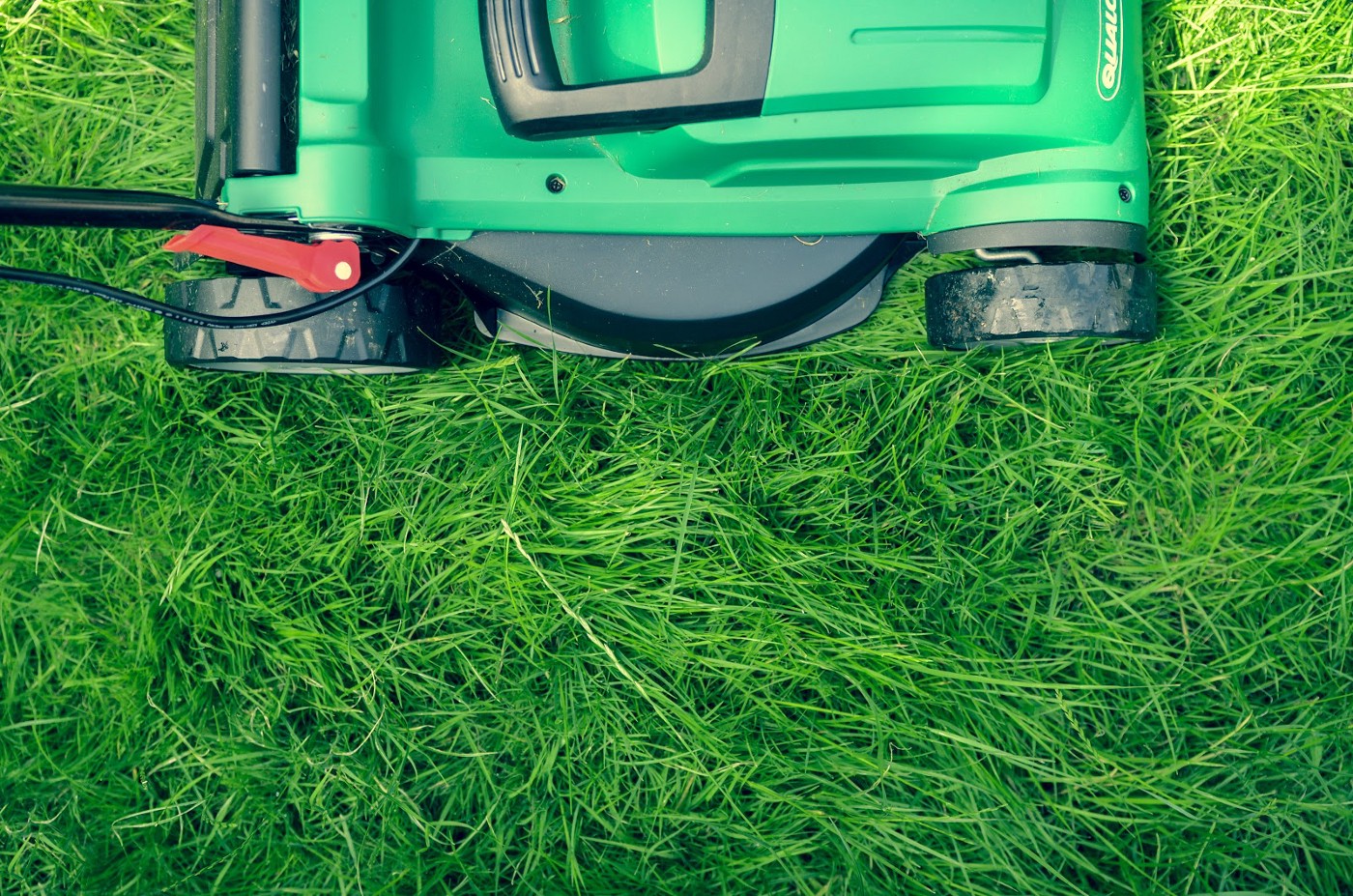
Lawn equipment thefts tend to increase during the spring and summer months. We advise citizens to be alert to potential criminals attempting to steal lawn equipment. Citizens are encouraged to secure their lawn equipment and take extra precautions to limit criminal opportunity.
Criminals desire lawn equipment during the spring and summer months because they are able to easily sell lawn equipment products due to the high product demand. However, criminal opportunity can be limited by alert and prepared citizens. Homeowners have many options they can review when considering the security of their lawn equipment.
Homeowners should check their homeowner’s insurance policy to ensure valuable lawn equipment items are covered under their current policy. If these items are not covered, homeowner’s may consider having these items added for an additional fee.
Homeowners should also complete a written inventory of their lawn equipment, noting the year, make, model number, serial number and a photo of each item. Homeowners may also consider engraving specific numbers or letters into the metal of the product to prevent removal. This will allow police the ability to better locate the item if it is stolen. Homeowners may also consider placing GPS tracking devices on valuable lawn equipment items such as riding lawn mowers. The GPS tracking devices should be hidden when placed on the desired lawn equipment. GPS devices can be found online and can be fairly reasonably priced.
Police remind homeowners to secure the area lawn equipment is stored. If lawn equipment is stored in the garage, a security alarm sensor could be considered and added to the current alarm system. Lawn equipment stored in a fenced backyard or shed should be secured by a heavy-duty sturdy lock. Motion sensor activated floodlighting and well-lit areas can help identify potential criminals. Security surveillance cameras that are motion activated and are equipped with night vision are also good options for homeowners to consider.
Discussion Post: Remove it, Lock it or Lose it
(Courtesy of Sgt. David Hicks from Montgomery Police Department)
Subject: Remove it, Lock it or Lose it
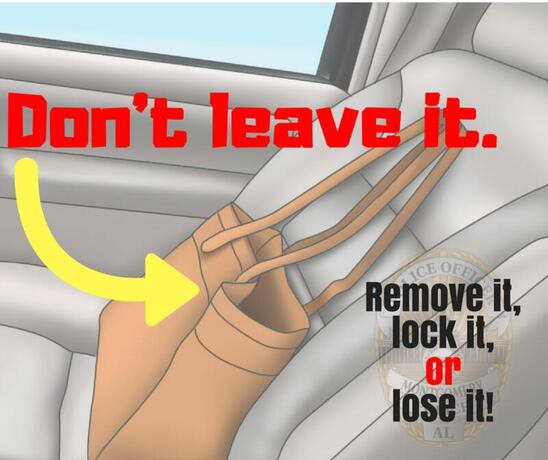
In an effort to help educate our neighbors and provide crime prevention information regarding unlawful breaking and entering into motor vehicle reports, the Police Department would like to remind everyone to “Remove it, lock it or lose it”. We encourage you to remove all valuable items from your vehicle and always lock your vehicle.
A criminal is always looking for an opportunity to commit a crime. Unlocked vehicle doors provide a criminal with instant opportunity. After reviewing vehicle burglary police reports, it appears that criminals have targeted unlocked vehicles and taken valuable items that were left in plain sight.
We have also seen forced entry made into some vehicles, in most of those instances items of value were left in plain sight. Criminals have been stealing cell phones, tablets, laptops, firearms, purses, tote bags, loose change and other items of value out of vehicles. In most instances, these occurrences have been crimes of opportunity.
We encourage our neighbors to remain vigilant and report suspicious activity or criminal activity while it is occurring to the Police Department by dialing 911. Remember, “Remove it, lock it or lose it”!
Working together, we can accomplish more!
Photo credit — City of Montgomery Alabama Police
Discussion Post: Utility Trailer Theft Prevention Tips
(Courtesy of Sgt. David Hicks from Montgomery Police Department)
Subject: Utility Trailer Theft Prevention Tips
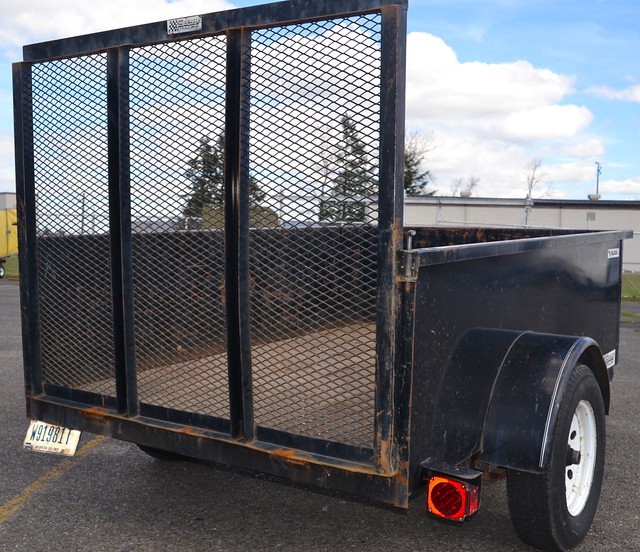
A utility trailer can be an easy target for a potential criminal. A utility trailer is easy to steal and can be difficult to identify. Help protect your utility trailer from being stolen by following these provided crime prevention tips.
Tip #1 — A criminal can paint over or remove most serial numbers that are located on a utility trailer. Engrave or weld identifying markings in several different places on the trailer to help you identify the trailer if it is stolen and later recovered.
Tip #2 — Lock your trailer with a heavy grade lock that is difficult to cut. Use a wheel lock for added protection.
Tip #3 — Secure your utility trailer by chaining it to a large weighted item or tree. Park it out of sight. If you have a security camera outside, have the camera lens facing the utility trailer. You could also consider installing a GPS tracking device on the trailer.
Tip #4 — Document all serial numbers and additional markings. Take current photos and keep all records of the utility trailer.
Remember, criminals like an easy target. The more difficult you make an item hard to steal, the better are your chances of keeping it.
Photo credit to https://www.flickr.com/photos/jblmmwr/
Discussion Post: Summer Vacation Crime Prevention Tips
(Inspired by Sergeant David Hicks from Montgomery Police Department)
Subject: Summer Vacation Crime Prevention Tips

Summer Vacation will be here before we know it, and the last thing you need after a relaxing vacation is to return home and find that you have been a victim of a criminal act, especially a burglary. Here are a few tips that may keep you from being a victim.
Remember to place your mail, packages, and newspaper on hold. Criminals notice when the mail piles up or newspapers are scattered on the lawn. Criminals know this is a good indication that you are out of town.
Place your lights, televisions, and radios on timers. This provides the image that someone is home. Be sure to close all blinds to ensure a potential criminal does not have the ability to peer inside your residence and monitor activity.
Be sure to lock all doors, windows, garage doors, storage sheds, vehicles, and gates prior to leaving your residence.
Remember to set your security alarm system if you have one. Test your system prior to leaving, to ensure it is functioning correctly. Ensure your personal contact information is also up-to-date; to ensure your alarm monitoring company has the ability to reach you.
Have a close trustworthy friend or relative check on your residence while you are away.
As excited as you may be to update your friends about your vacation on social media, you may strongly wish to reconsider. Remember, anyone that is able to access your social media profile, will gain insight that you are away on vacation. Potential criminals pay attention to these details and could attempt to break into your home while you are away.
Poll: If you own a gun, is it stored safely?
Screenshot is taken from — https://www.projectchildsafe.org/

For “Ask a question”: If you own a gun, is it stored safely?
For “Add a poll description”:
If you are a firearm owner, it is your responsibility to ensure that guns in your home are always stored where they are inaccessible to children or other unauthorized persons. Hiding a gun in a closet, drawer or similar location is not safe storage. Safe storage is employing precautions and multiple safeguards that provide an additional barrier against unauthorized use.
KEY GUIDELINES FOR SAFE STORAGE INCLUDE:
- Unloaded firearms should be stored in a locked cabinet, safe, gun vault or storage case. The storage location should be inaccessible to children.
- Gun locking devices render firearms inoperable and can be used in addition to locked storage. If firearms are disassembled, parts should be securely stored in separate locations.
- Ammunition should be stored in a locked location separate from firearms.
- Thoroughly double check firearms to confirm that they are unloaded when you remove them from storage. Accidents could occur if a family member borrows a gun and returns it to storage while still loaded.
For more tips see — https://www.projectchildsafe.org/safety/safe-storage
For “Add a choice” fields:
- All our gun(s) are stored safely as described
- Some of our gun(s) are stored safely as described
- None our gun(s) are stored safely as described
* We recommend you close the discussion to this poll and ONLY allow voting
Discussion Post: What is suspicious activity?
Subject: What is suspicious activity?
The screenshot is taken from — https://unsplash.com/photos/xxZCfAnMUrM

Message:
“Am I witnessing a crime?” Most of us have found ourselves wondering this at some point or another. However, because we’re not really sure, we tend to ignore what we have just seen and, hoping it wasn’t so, we continue about our business.
People aren’t suspicious, behavior is!
Always consider the context for what you are witnessing and remember there may be a simple explanation for activity that at first glance appears suspicious. Here are behaviors that may be associated with criminal activity:
- Someone walking down the street looking into multiple vehicles and/or trying door handles to see if the doors will open.
- Someone taking a package from someone else’s property (keep in mind that sometimes neighbors leave or pick up packages for other neighbors).
- A person who is not your neighbor walking about your neighbor’s home and looking into windows, or trying to gain access by forcing open a window or door.
- A person knocking on your door and asking to speak with someone who does not live there and who may also go to other homes knocking on doors. This is a tactic used by people with the intent to burglarize to see if people are home. (Keep in mind that people may mistakenly go to the wrong home.)
- Someone claiming to represent a utility company who is either not wearing a uniform does not produce identification upon request or does not have a company logo vehicle.
- Someone using binoculars or other devices to peer into your or your neighbors’ homes.
- At night, a person sitting inside a vehicle that you do not recognize with the lights off for an extended period of time.
- A pushy salesperson not producing identification upon your request or asking to come into your home.
- A vehicle you do not recognize that is circling multiple times around the neighborhood.
Remember, if you think that a crime may be occurring, or that the safety of you or your neighbors may be at risk, don’t hesitate to call 911. You shouldn’t worry about using up police time. Calls to 911 will be prioritized based on the availability of law enforcement. Your call could be the one that lets us put a stop to the break-ins or a crime streak in your neighborhood. We are happy to check things out!
Top 10 tips to keep you safe while walking
Subject: Top 10 tips to keep you safe while walking
Screen capture is taken from — https://unsplash.com/photos/zEpAZCWzGhg
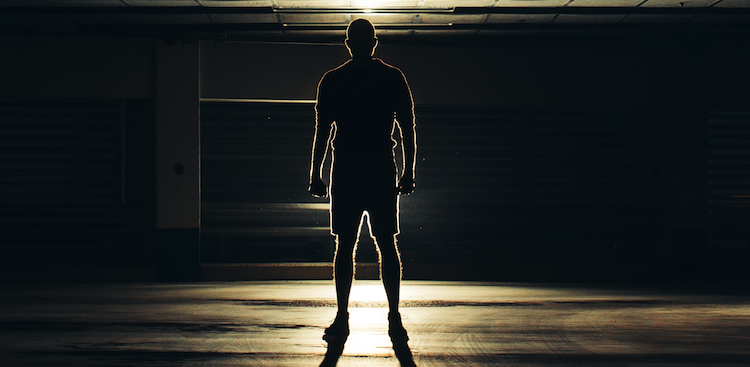
Neighbors,
Here are our top 10 tips to keep you safe while walking:
1) Avoid walking alone and trust your instincts.
2) Be aware of your surroundings and the people around you. Do not text or talk on a cell phone or listen to music while walking, doing so makes you a target for criminals.
3) Cross the street to avoid groups loitering or hanging out.
4) Stay in well-lit areas as much as possible.
5) Walk close to the curb and avoid doorways, bushes, and alleys where someone could hide.
6) Walk confidently, with a purpose and at a steady pace.
7 Make eye contact with people when walking.
8) If you carry a purse, hold it securely between your arm and body.
9) Keep your house or car keys ready and have them out as you approach your house or car.
10) If someone is behaving suspiciously move away from them, make a mental note of what the person looks like and the clothes and shoes they are wearing, then call 9–1–1.
If you feel threatened or are followed, cross the street. Trust your instincts. Do not allow a stranger to follow you to your doorstep. Go to a public place; enter a store, or place of business where you can call the police safely. If you are in your own neighborhood, after calling 911, send out an urgent alert to your neighbors on Nextdoor.
If you are ever confronted, try to remain calm. A person will be less likely to attack you if you appear controlled and self-confident. If a person states they have a weapon, don’t challenge him/her, do not resist — cooperate. Also, never try to apprehend a criminal.
Remember, always call 9–1–1 first. When you call 911, state your location, the address where you are, the closest intersection, and the city/town you are in followed by the reason for calling and give a description of the behavior you are witnessing and of persons
Finally, remember that a person’s behavior is what makes them suspicious, not what they look like. Check out Nextdoor guideline for identifying and communicating about suspicious behavior — -> https://help.nextdoor.com/s/article/How-to-communicate-a-crime?language=en_US
If you have any tips for your neighbors, please leave them below.
Discussion post: Top 10 ATM Safety Tips
Screen capture is taken from — https://unsplash.com/photos/eYZpTMc7hno
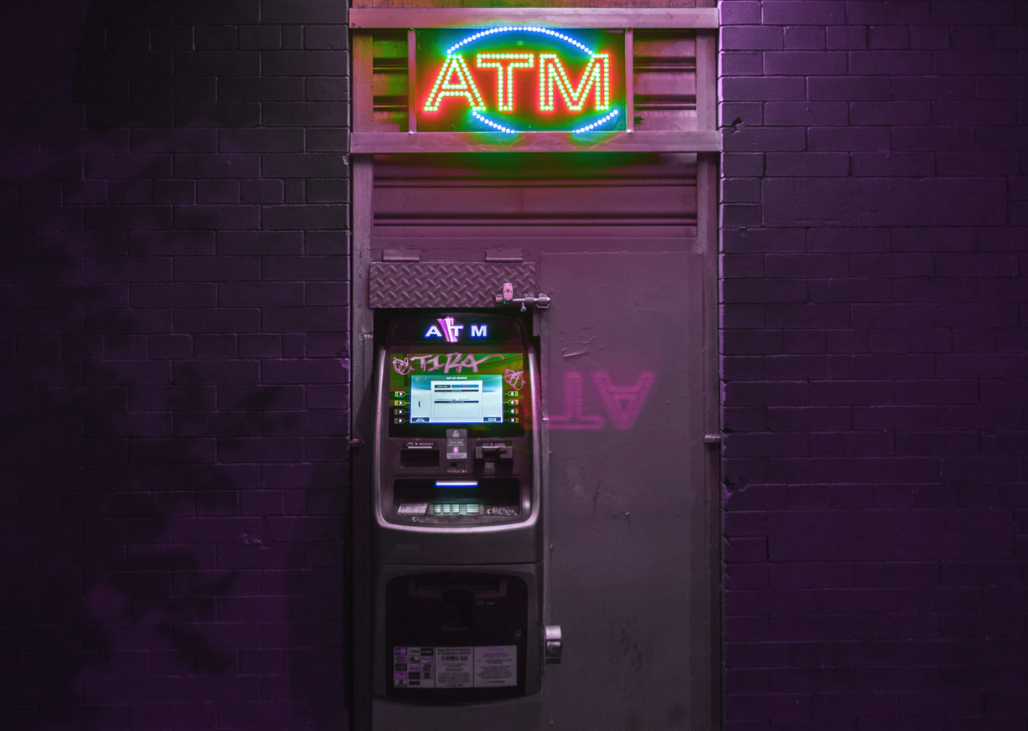
Subject: Top 10 ATM Safety Tips
Neighbors,
Here are our top 10 ATM safety tips. Please take a moment to read and share with neighbors, friends, and family.
1. Always pay close attention to the ATM and your surroundings. Don’t select an ATM at the corner of a building — corners create a blind spot. Use an ATM located near the center of a building. Do your automated banking in a public, well-lit location that is free of shrubbery and decorative partitions or dividers.
2. Maintain an awareness of your surroundings throughout the entire transaction. Be wary of people trying to help you with ATM transactions. Be aware of anyone sitting in a parked car nearby. When leaving an ATM, make sure you are not being followed. If you are, drive or walk immediately to a police or fire station, or to a crowded, well-lit location or business. If you feel you are in danger, call 911!
3. Do not use an ATM that appears unusual looking or offers options with which you are not familiar or comfortable.
4. Do not allow people to look over your shoulder as you enter your PIN. Memorize your PIN; never write it on the back of your card. Do not re-enter your PIN if the ATM eats your card — contact a bank official.
5. Do not wear expensive jewelry or bring other valuables with you to the ATM. This is an added incentive to the assailant.
6. Never count cash at the machine or in public. Wait until you are in your car or another secure place.
7. When using a drive-up ATM, keep your engine running, your doors locked and leave enough room to maneuver between your car and the one ahead of you in the drive-up line.
8. Maintain a supply of deposit envelopes at home or in your car. Prepare all transaction paperwork prior to your arrival at the ATM. This will minimize the amount of time spent at the machine.
9. Closely monitor your bank statements, as well as your balances, and immediately report any problems to your bank.
10. If you are involved in a confrontation with an assailant who demands your money, COMPLY.
I hope you find this helpful!
General public safety posts
Discussion post: Can YOU SEE your house numbers/address on your mailbox/house?
Subject: Can YOU SEE your house numbers/address on your mailbox/house?
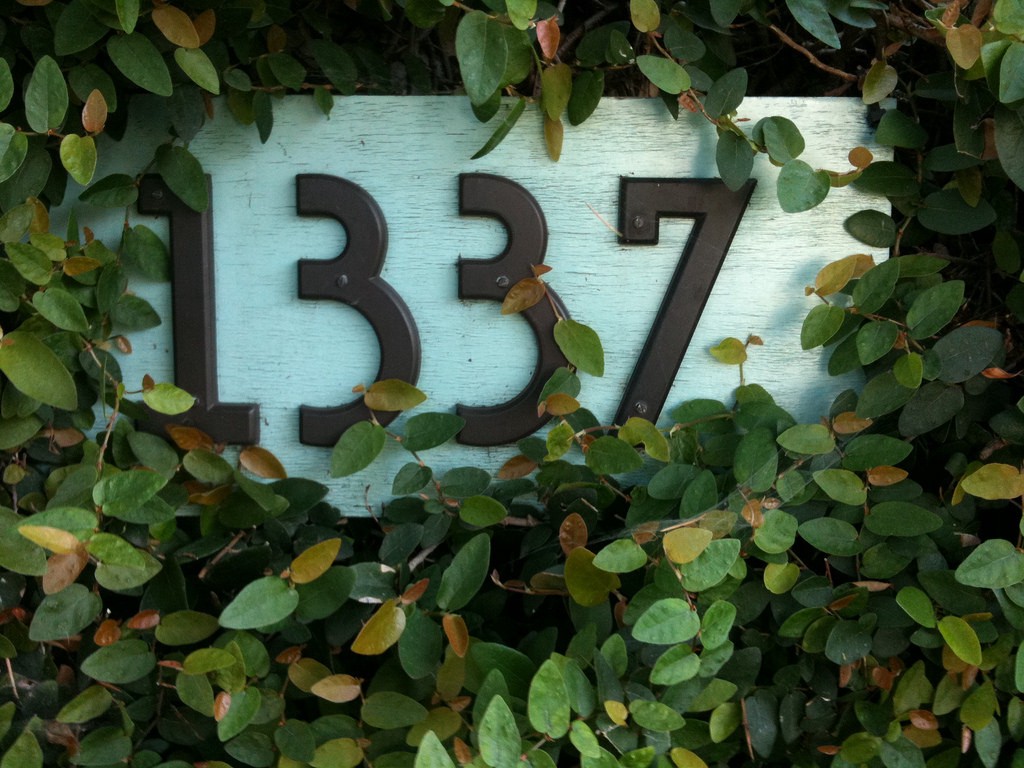
Dear neighbors,
When you have lived at the same address for a number of years, you rarely pay any attention to your house numbers (address).
For Police Officers, EMS, and Fire that may be responding to your house in the event of an emergency, your house numbers are what they are looking for.
Make it a point, to LOOK at your house numbers to see if:
-All of the numbers are still there
-They are Large enough to be seen easily from the street
-Any landscape vegetation has grown over them limiting there visibility
If you can see them, So can we…Thank YOU!
If not, then we can’t either. Please take steps today so we can find should you need us tomorrow.
Photo credit to Michael Carian http://bit.ly/2lBGGKH
Poll: Did you know Nextdoor will pay for and mail postcards use can use to invite your neighbors whom you do not yet know?
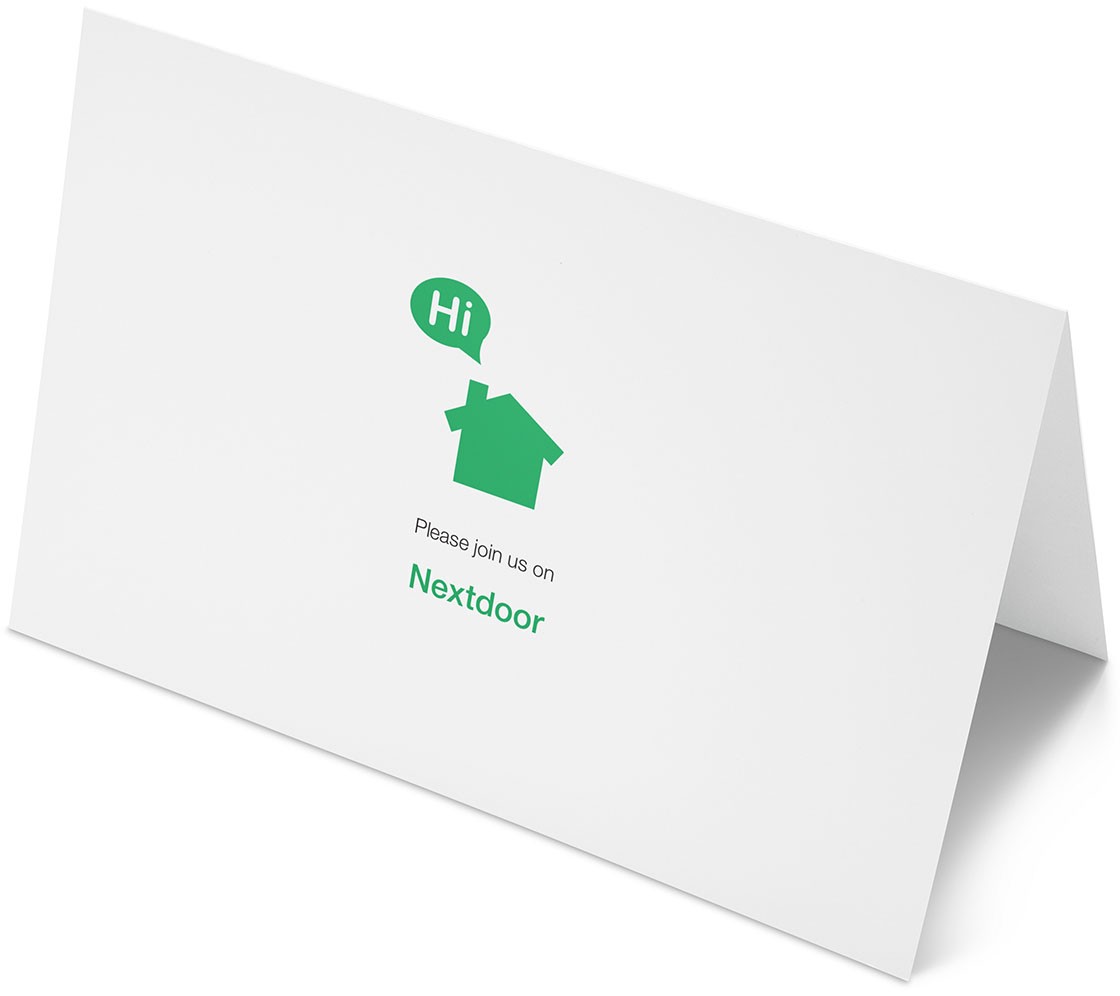
For “Ask a question”: Did you know Nextdoor will pay for and mail postcards for you to invite your neighbors whom you do not yet know?
For “Add a poll description”: During an emergency or disaster, you and your neighbors may likely serve as each other’s first responders. Being able to communicate with each other is key. To help ensure more of your neighbors can communicate, Nextdoor will pay for and mail postcards on your behalf to neighbors you do not yet know. You can learn how to send postcards here → https://help.nextdoor.com/s/article/How-to-send-postcard-invitations
For “Add a choice” fields:
- Sure did
- I did not, thanks
Assessing the value of communications on Nextdoor
Poll: Have our communications on Nextdoor been helpful?

For “Ask a question”: Have our communications on Nextdoor been helpful?
For “Add a poll description”: Our goal is to ensure you are informed about crime trends in your particular neighborhoods and how we can partner together to deter and reduce crime.
If there is something we can be doing better, please kindly leave your suggestions below as a comment.
For “Add a choice” fields:
- Yes
- Somewhat
- No

